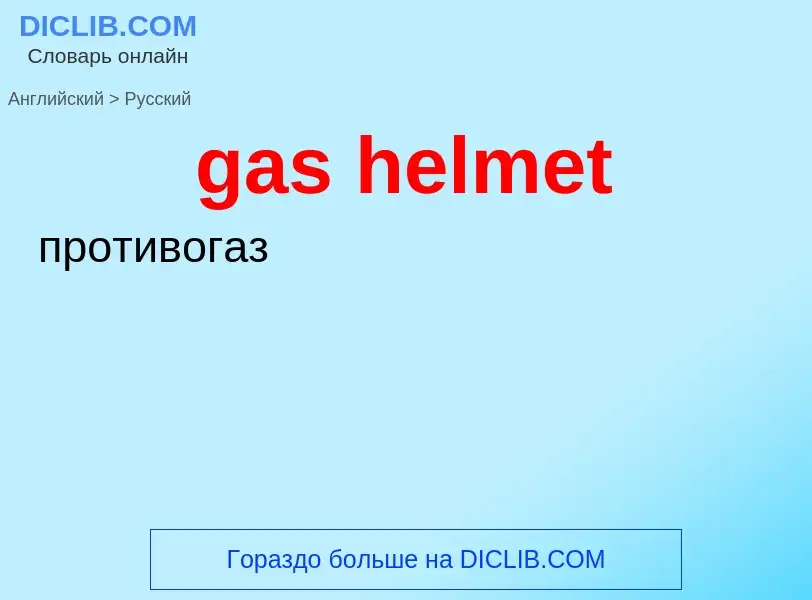Vertaling en analyse van woorden door kunstmatige intelligentie ChatGPT
Op deze pagina kunt u een gedetailleerde analyse krijgen van een woord of zin, geproduceerd met behulp van de beste kunstmatige intelligentietechnologie tot nu toe:
- hoe het woord wordt gebruikt
- gebruiksfrequentie
- het wordt vaker gebruikt in mondelinge of schriftelijke toespraken
- opties voor woordvertaling
- Gebruiksvoorbeelden (meerdere zinnen met vertaling)
- etymologie
gas helmet - vertaling naar russisch
['gæsmɑ:sk]
существительное
общая лексика
противогаз
Definitie
Wikipedia

A gas mask is a mask used to protect the wearer from inhaling airborne pollutants and toxic gases. The mask forms a sealed cover over the nose and mouth, but may also cover the eyes and other vulnerable soft tissues of the face. Most gas masks are also respirators, though the word gas mask is often used to refer to military equipment (such as a field protective mask), the scope used in this article. The gas mask only protects the user from digesting, inhaling, and contact through the eyes (many agents affect through eye contact). Most combined gas mask filters will last around 8 hours in a biological or chemical situation. Filters against specific chemical agents can last up to 20 hours.
Airborne toxic materials may be gaseous (for example, chlorine or mustard gas), or particulates (such as biological agents). Many filters provide protection from both types.
The first gas masks mostly used circular lenses made of glass, mica or cellulose acetate to allow vision. Glass and mica were quite brittle and needed frequent replacement. The later Triplex lens style (a cellulose acetate lens sandwiched between glass ones) became more popular, and alongside plain cellulose acetate they became the standard into the 1930s. Panoramic lenses were not popular until the 1930s, but there are some examples of those being used even during the war (Austro-Hungarian 15M). Later, stronger polycarbonate came into use.
Some masks have one or two compact air filter containers screwed onto inlets, while others have a large air filtration container connected to the gas mask via a hose that is sometimes confused with an air-supplied respirator in which an alternate supply of fresh air (oxygen tanks) is delivered.





![Iranian soldier wearing a US M17 protective mask on the frontline of the [[Iran–Iraq War]] Iranian soldier wearing a US M17 protective mask on the frontline of the [[Iran–Iraq War]]](https://commons.wikimedia.org/wiki/Special:FilePath/Chemical weapon1.jpg?width=200)

![Zelinsky–Kummant ''protivogaz'', designed in 1915, was one of the first modern-type full-head protection gas masks with a detachable filter and eyelet glasses, shown here worn by U.S. Army soldier ([[USAWC]] photo) Zelinsky–Kummant ''protivogaz'', designed in 1915, was one of the first modern-type full-head protection gas masks with a detachable filter and eyelet glasses, shown here worn by U.S. Army soldier ([[USAWC]] photo)](https://commons.wikimedia.org/wiki/Special:FilePath/Man wearing a Zelinsky-Kummant gas mask.jpg?width=200)

![Pioneers]] in gas masks. [[USSR]], 1937 Pioneers]] in gas masks. [[USSR]], 1937](https://commons.wikimedia.org/wiki/Special:FilePath/Viktor Billa Oborona pionerov.jpg?width=200)


![Greek Infantry with US [[M17 gas mask]]s Greek Infantry with US [[M17 gas mask]]s](https://commons.wikimedia.org/wiki/Special:FilePath/Gas mask greek.jpg?width=200)

![Eastern Front]] during World War I Eastern Front]] during World War I](https://commons.wikimedia.org/wiki/Special:FilePath/Various gas masks WWI.jpg?width=200)


